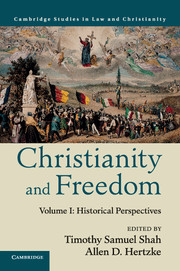Book contents
- Frontmatter
- The Religious Freedom Research Project
- Contents
- Contributing Authors
- Acknowledgments
- Introduction: Christianity and Freedom: Ancient Roots and Historical Innovations
- 1 The Roots of Religious Freedom in Early Christian Thought
- 2 The Christian Roots of Religious Freedom
- 3 Lactantius on Religious Liberty and His Influence on Constantine
- 4 Augustine and Religious Freedom
- 5 Christianity and the Roots of Human Dignity in Late Antiquity
- 6 Liberty of Conscience and Freedom of Religion in the Medieval Canonists and Theologians
- 7 Faith, Liberty, and the Defense of the Poor: Bishop Las Casas in the History of Human Rights
- 8 Calvinist Contributions to Freedom in Early Modern Europe
- 9 Constitutional Protection of the Freedom of Conscience in Colonial America: The Rhode Island and Pennsylvania Experiments
- 10 Christianity and Freedom in the American Founding
- 11 Vibrant Christian Pluralism and the Evolution and Defense of Religious Liberty in America
- 12 Orthodox Christian Contributions to Freedom: Historical Foundations, Contemporary Problematics
- 13 Christianity: A Straggler on the Road to Liberty?
- 14 Protestant Missionaries and the Centrality of Conversion Attempts for the Spread of Education, Printing, Colonial Reform, and Political Democracy
- 15 God and Freedom: Biblical Roots of the Western Idea of Liberty
- Index
2 - The Christian Roots of Religious Freedom
Published online by Cambridge University Press: 05 May 2016
- Frontmatter
- The Religious Freedom Research Project
- Contents
- Contributing Authors
- Acknowledgments
- Introduction: Christianity and Freedom: Ancient Roots and Historical Innovations
- 1 The Roots of Religious Freedom in Early Christian Thought
- 2 The Christian Roots of Religious Freedom
- 3 Lactantius on Religious Liberty and His Influence on Constantine
- 4 Augustine and Religious Freedom
- 5 Christianity and the Roots of Human Dignity in Late Antiquity
- 6 Liberty of Conscience and Freedom of Religion in the Medieval Canonists and Theologians
- 7 Faith, Liberty, and the Defense of the Poor: Bishop Las Casas in the History of Human Rights
- 8 Calvinist Contributions to Freedom in Early Modern Europe
- 9 Constitutional Protection of the Freedom of Conscience in Colonial America: The Rhode Island and Pennsylvania Experiments
- 10 Christianity and Freedom in the American Founding
- 11 Vibrant Christian Pluralism and the Evolution and Defense of Religious Liberty in America
- 12 Orthodox Christian Contributions to Freedom: Historical Foundations, Contemporary Problematics
- 13 Christianity: A Straggler on the Road to Liberty?
- 14 Protestant Missionaries and the Centrality of Conversion Attempts for the Spread of Education, Printing, Colonial Reform, and Political Democracy
- 15 God and Freedom: Biblical Roots of the Western Idea of Liberty
- Index
Summary
It was once assumed that religious freedom was a work of the Enlightenment. In the sixteenth century, so the story goes, when the Reformation made its way across Europe, confessional differences led to the suppression and persecution of Christians by Christians. As the decades passed, religious differences hardened and Protestant and Catholic armies faced one another on the field of battle. A half-century of bloody conflict, the so-called wars of religion, was set in motion. But by the middle of the seventeenth century, men with greater wisdom and less religious fervor entered the scene and the fanaticism of religious believers gave way to the cool reason of philosophers. Armed with notions about the superiority of reason to faith, skeptical of received truth, and distrustful of religious claims and institutions, these enlightened thinkers forged a new set of ideas about toleration and religious freedom. Through their labors the modern idea of liberty of conscience was born.
This tale has been modified in recent decades. John Locke, whose Letter Concerning Toleration, published in 1689, was viewed as a charter document of religious freedom, has been deposed from his place of honor. He was a latecomer to the project of religious freedom, and his key ideas are found in earlier writers. In her book Liberty of Conscience, Martha Nussbaum argued that the first and most articulate exponent of liberty of conscience was Roger Williams, who lived two generations before Locke. But she ignores the religious and intellectual background of his thinking. A hundred years ago an Austrian scholar, George Jellinek, traced the roots back to the Reformation era, particularly to the Puritans. “The idea of legally establishing inalienable, inherent and sacred rights of the individual is not of political but religious origin.”
All these accounts move within too narrow a historical horizon. The roots of religious freedom in the West are to be found many centuries earlier, in the writings of Christian apologists who wrote in defense of the right to practice their faith in the cities of the Roman Empire. This essay traces the early history of religious freedom in the West and shows how it provided the tools for Christian thinkers in the early modern period to formulate a full doctrine of religious freedom and liberty of conscience.
- Type
- Chapter
- Information
- Christianity and Freedom , pp. 62 - 89Publisher: Cambridge University PressPrint publication year: 2016
- 1
- Cited by

